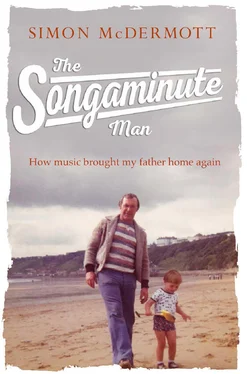Ted got a job as a watchman on one of these sites and immediately earned himself a reputation as a loveable joker, sticking his head in the cement mixer and singing a tune, asking them what it sounded like. He was always singing and, just as in his Army days, constantly dreaming of other things. He always made sure he did the job in hand and was respectful to his co-workers and bosses, but he found it hard to concentrate on anything that wasn’t music, so the job was a godsend. The site in question was just down the road from his house, so he would have a quick look round to check everything was in order and then slope off home to learn his songs and watch TV (they’d only just been able to afford one, so the novelty still hadn’t worn off).
This all worked brilliantly for Ted until one day, as he sat with his feet up watching a TV show and eating his lunch, one of the local kids started banging on the door and screaming: ‘Fire! Fire!’ At first Ted thought he was pulling his leg and that maybe one of his brothers had sent the kid to wind him up, but then he heard the fire engines racing up the road. Ted had never run so fast in his life as he sprinted to the site to find it was indeed on fire. It was a disaster and the others couldn’t wait to tell his dad what had happened on Ted’s watch – it was one of those rare times when Maurice went mad at Ted – this was definitely something he couldn’t charm his way out of. His parents made it clear how unimpressed they were, as did his bosses. It all blew over eventually, but it definitely taught him a valuable lesson.
Ted’s wheeling and dealing became legendary – especially when he went through the phase of offering to put on bets for some of the blokes on the building site. He and his mate Georgie had more freedom than the rest to come and go from the site and were able to slip away to place bets for all the workers, who were almost religious about gambling. One day a chap gave them a double bet to put on. Ted was adamant they had backed the wrong horse and wouldn’t win anyway, and so he decided to keep the money instead.
Ray Barns worked on the site with Ted and knew that he hadn’t placed the bet and so was keeping an eye on the race for him – the next thing you know he’s bursting through the doors to where Ted was quietly having a cup of tea on his break and shouting: ‘Ted, Ted! That horse has only gone and bloody won 100 to 8!’ They all dashed back to the betting office, praying the next horse wouldn’t win. It was neck and neck and went to a photo finish. Ted and Georgie were panicking because they were about to lose a month’s wages each. Luckily for them the horse lost; it was probably one of the closest calls he had.
Moving forward, Ted’s varied career included working for the council in the gardens, often driving home for his lunch in a dumper truck he’d ‘borrowed’ (despite not having a driving licence), and then working for the water board. He wasn’t beyond enlisting the younger kids to earn extra cash either, telling them to keep their eyes peeled for a leak in the street, as he would get paid extra for spotting any and reporting them.
Weekends were still a time for Ted to let down his hair and now that he was that bit older and had more spare cash, he would travel further afield than The Cora. He started popping up to Taffy Griffiths Coach Station on Crankhall Lane in Wednesbury. He’d ask the coach drivers where they were headed and if he fancied it – usually Blackpool or Worcester – would find a spare seat and off he’d go. He didn’t have a grand plan but was happy to travel where the wind took him. Not shy of talking to strangers and in search of a new adventure, he would pal up with someone on the coach and end up singing in an unknown bar or club, where they’d often have a collection for him, before heading back on the first coach the next morning. After a while most of the drivers got to know him and would let him sleep in the back of the coaches – sometimes they’d even wait for him to make sure he had a lift back home. Blackpool was a regular holiday destination for many of the lads on the estate, though perhaps a less popular choice just for a night out, but Ted had no qualms about going further from home for more singing experience, sometimes even entering talent shows and winning. Hilda never knew if he was coming home or not, but she learned not to fret if his bed was empty in the morning.
‘He never looked on the bad side of life,’ says Ted’s brother-in-law, Tony. ‘No matter what you talked about, he’d always make it cheerful. It was as if all the troubles of the world could be on his shoulders but he was always out smiling. He never worried about a thing.’
One thing that Ted did learn early on was that even though singing wasn’t ever going to be his main job, it could still bring in some cash, and he’d often tell his brother Maurice: ‘If you can get up and play an instrument or sing, you don’t need any money when you go out’ cos they’ll have a collection for you afterwards.’ This was particularly true in The Cora, where the crowd were brilliant at showing appreciation for great singers: it spoke volumes that there was always a collection for Ted whenever he got up to sing.
Chapter 5
Ted remained close to all of his brothers – even as time marched on and they married, inevitably making their own lives outside the family home. He and Ernie were particularly tight, but so many of their scrapes and stories will remain untold – swallowed by the ravages of Alzheimer’s in Ted’s case and Ernie’s early death from cancer in 2012.
Ernie probably knew more about the inner workings of Ted’s mind than anyone else and their bond meant that he could see beyond his brother’s cheery persona and ability to always see the good in any situation. Ernie’s friends used to describe Ted as someone who could pick up any conversation and make it upbeat, but there was far more to him than that and his brother knew it. The frustration of not being able to make his passion a full-time job disheartened Ted as he got older and the opportunities slipped further away. He was most definitely ahead of his time and there was an honour in wanting to pursue it, but there was also the reality of responsibility and Ted knew he couldn’t escape that; no one could.
But no matter how much real life kept elbowing its way in, Ted remained committed to music. Whenever a new record came out, he would go straight up to Paradise Street in West Bromwich and he’d return home with both the record and the sheet music, so that he could take it to the pub and ask the pianist to play it while he sang. One of his favourite record shops was Al Cooper’s – he knew the owner and was always popping in and out whenever he could. In the cellars Al had all the old records from years back that he hadn’t managed to sell; all the real classics had a little stamp on them – 2d – which was about the price of a pint of beer. So Ted would be down there for hours listening to Al’s record stash, drinking tea and singing along – it was his ideal way to spend the day.
Playing music at Al’s and at home took the edge off everything, even the fact he had very little money. He’d drive the household – particularly Maurice – mad as he repeatedly stopped and started tracks on his home record player, writing down the lyrics line by line so that he could learn them off by heart and sing the song all the way through over and over again. Maurice could often be heard shouting, ‘For Christ’s sakes, Big’ Un! If you’re gunna play it, play it!’ A new track would be learned every Saturday without fail, then Ted would get dressed up and go down to The Cora to perform it. He had his finger on the pulse and never executed the same track twice. He’d always make sure he listened to up-and-coming songs right away, often sending his younger sister, Joyce, down to Woolworths with enough cash to buy a new record and a bag of broken biscuits as a reward for helping him out. In truth, ‘that bloody record player’ (as it was known) could have blown up the house, as at the time there were no plug sockets upstairs. That meant Ted running the cable to the record player through a light – essentially running a naked wire straight from the light fitting in the ceiling. It was just as well that no one was aware how dangerous this was, because it definitely took the idea of dying for his music to a whole new level. In fact, although Ted was known for helping out in any way he could, the one area that he was encouraged to keep away from was DIY. Hilda lived in fear of him trying to fix anything. She learned to keep quiet when anything went wrong in the kitchen, particularly if it involved the electrics. If Ted became aware there was a problem, he would drop everything, roll up his sleeves and say to Hilda: ‘Right, what do you need me to do?’, insisting until she felt she couldn’t say no without hurting his feelings. The whole house knew what a disaster he was and Malcolm, Gerry and Karen would often hide behind the kitchen door, laughing as Ted got to grips with the job in hand. Often, if he didn’t have a plug, he would just feed wires straight into the socket with a couple of matchsticks wedged in to stop them falling out.
Читать дальше












